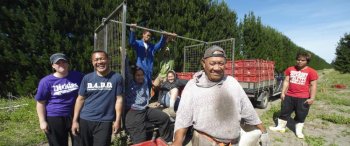
He notes that the workers come to New Zealand for, on average, about six months, and then they return home. “They do not migrate to New Zealand, but what they do is ensure that critical seasonal orchard and packhouse work is completed on time. Their contribution to New Zealand is financial, and they are a key part in ensuring that our growing horticulture exports add to New Zealand’s wealth.”
Chapman adds that another common misconception is that the RSE workers are not skilled. “They are skilled orchard and packhouse workers who have been trained to the highest standards for their required tasks. They are a skilled workforce that is an integral part of New Zealand’s horticultural workforce, and while the RSE workers are in New Zealand they also learn additional skills, such welding and building, so that when they return to their homes they can contribute to their local economies.”
Another telling result from the RSE scheme is that it has resulted in more New Zealanders being employed, as recently explained by the Immigration Minister. With the publication of the 8th annual RSE survey, 79% of the 92 employers that answered the survey reported that they had employed more permanent Kiwis, in addition to their RSE workers. Chapman says, “This is not surprising, as in the last two years horticultural exports have grown by 40%. A growing industry needs more permanent Kiwi workers, as well as a regular supply of skilled and reliable seasonal workers like those in the RSE scheme.”
Full details of the survey are available here.
Chapman says that the bottom line is that the RSE scheme is world-class. “It’s a win for the RSE workers, a win for their homes and countries, a win for horticultural employers, and a win for New Zealand.”
Source: HortNZ



 Classifieds
Classifieds

